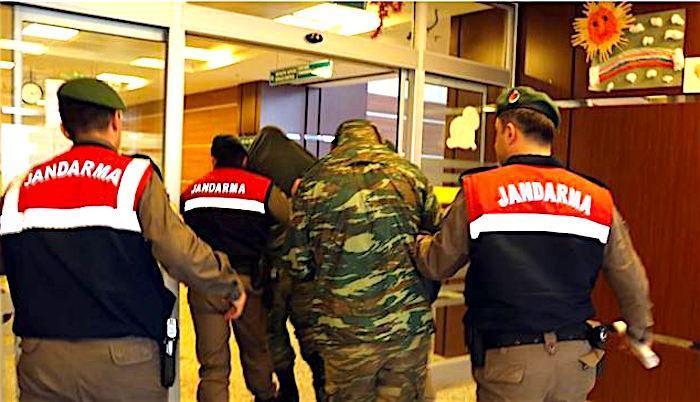
Greek Prime Minister Alexis Tsipras on April 23 ruled out any trade off with Turkey for the release of two Greek soldiers held by Ankara, saying Athens’ NATO ally “appeared to be losing sight of moving closer to Europe.”
“Turkey looks like a country ... at risk of losing its orientation and moving away from its European targets,” Tsipras said.
Tsipras, who was speaking to lawmakers of his Syriza party, said however that he welcomed recent comments by President Recep Tayyip Erdoğan on the “need and value” of peaceful relations with Greece.
Earlier in the day, Greek President Prokopis Pavlopoulos on April 23 rejected Erdoğan’s offer of a “swap deal” involving two Greek soldiers jailed in Turkey in exchange for Turkish soldiers wanted by Ankara over the 2016 failed coup.
Pavlopoulos ruled out the potential swap after Erdoğan on April 21 said his government would consider the Greek soldiers’ case if Athens extradited the Turkish soldiers.
“An exchange of the two Greek soldiers that are jailed with the eight Turkish soldiers that are in Greece is out of the question,” said Pavlopoulos.
The two Greek soldiers were charged with espionage in Turkey after crossing over the border on March 2. They claim to have lost their way in the fog.
The eight Turkish soldiers fled their home country to Greece after the July 2016 coup attempt.
Greece’s Supreme Court has ruled that the men will not be extradited, despite Turkish demands for them to face charges at home. The suspects denied involvement in the coup attempt.
Erdoğan on April 22 said his government would consider the case of two Greek soldiers jailed in Turkey if Athens extradited the soldiers suspected of the 2016 failed coup.
“They [Greece] ask us to give back the Greek soldiers and we have told them ‘if you make such a demand, you should first give us the Fethullahist Terrorist Organization [FETÖ] soldiers involved in a coup against our state,’” Erdoğan said.
“If they are handed to us, we will consider” the situation over the Greek soldiers, he said.
“When I spoke about a hostage situation of the Greek soldiers I was mocked. Sadly, I am confirmed by this proposal of exchange”, the Greek Defence Minister, Panos Kammenos said on April 21, commenting on Erdoğan’s interview.
Meanwhile, Greek Prime Ministry on April 22 said it considered the Turkish president’s call for peace “a positive step.”“From the Turkish president’s statements yesterday, we keep the positive elements: His shift towards peace in the Aegean and the support for dialogue between the two countries on important sectors, among which is security,” said a statement from the Greek Prime Ministry.
On April 21, Erdoğan called for peace with Greece and said he does not want any more tension, amid provocations in the Aegean and Mediterranean.
“We need peace now. Besides, our peace with you is like no other,” he said, during a live interview with NTV.
However, Greece rejected any suggestion of a trade-off for the release of two Greek soldiers it says are being unjustifiably held by Turkey in a case that has deepened strains between the two NATO allies.
“Concerning references to an exchange ... Between the matter of the Greek soldiers and other issues, we stress once more that it is unacceptable and is rejected,” a statement from the office of Greek Prime Minister Alexis Tsipras said.
“The position of Greece, and of the EU in its entirety, is clear and consistent: We seek the immediate release of the two Greek soldiers without conditions,” it added.
Turkey’s ties with Greece have taken a strained turn over Athens’ failure to extradite eight Turkish soldiers Ankara suspects to have been part of the coup bid. Greek authorities have said they would not have a fair trial in their home country as the purge of Erdoğan opponents continue under the state of emergency.
On April 21, Erdoğan said Greece had become a “first stop” for coup suspects who later flee to other European countries.